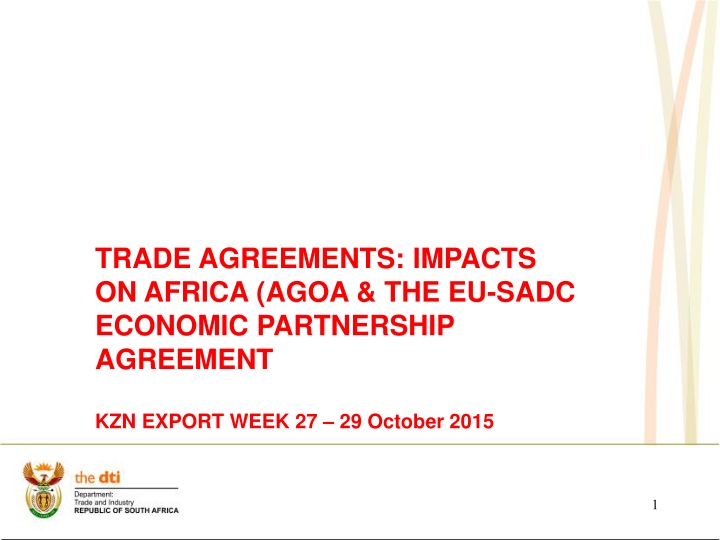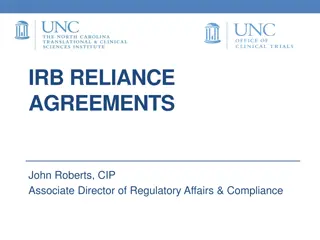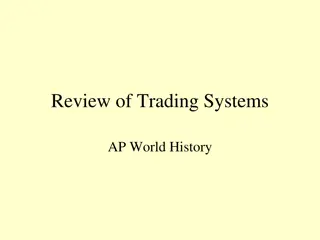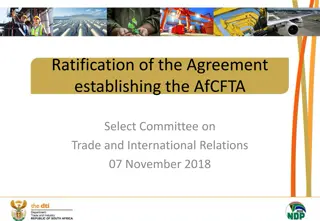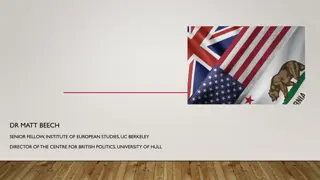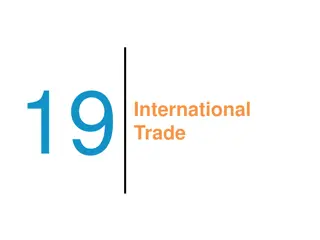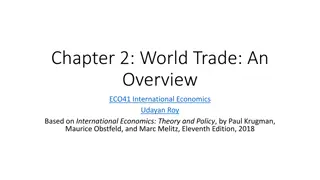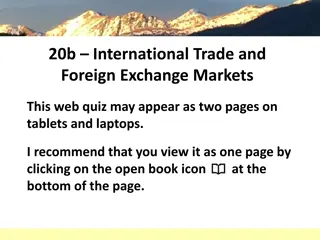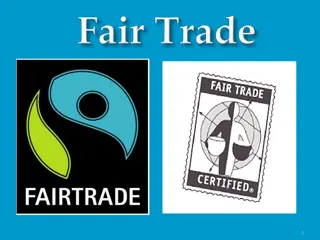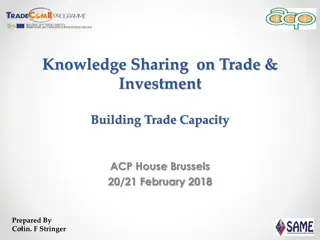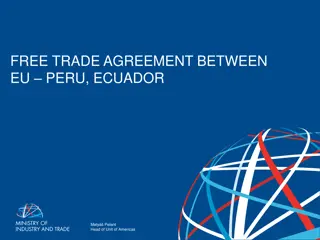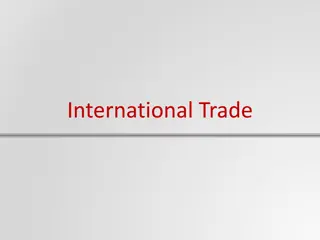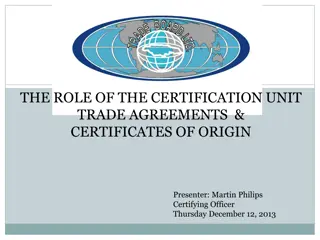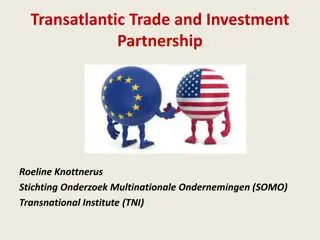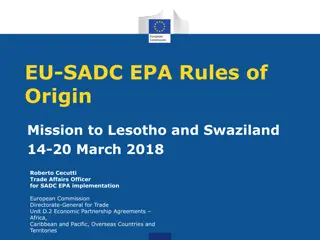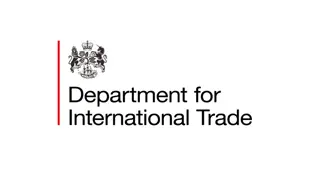Impacts of Trade Agreements on Africa's Development
Trade agreements such as AGOA and the EU-SADC Economic Partnership Agreement have significant impacts on Africa's trade and development. These agreements influence export opportunities, national development policies, and regional integration efforts. The negotiations between SADC EPA Group and the EU highlight key policy parameters and concessions made by South Africa in exchange for improved market access. The ratification process and provisional application of the agreements also play a crucial role in shaping future trade relations.
Download Presentation

Please find below an Image/Link to download the presentation.
The content on the website is provided AS IS for your information and personal use only. It may not be sold, licensed, or shared on other websites without obtaining consent from the author.If you encounter any issues during the download, it is possible that the publisher has removed the file from their server.
You are allowed to download the files provided on this website for personal or commercial use, subject to the condition that they are used lawfully. All files are the property of their respective owners.
The content on the website is provided AS IS for your information and personal use only. It may not be sold, licensed, or shared on other websites without obtaining consent from the author.
E N D
Presentation Transcript
TRADE AGREEMENTS: IMPACTS ON AFRICA (AGOA & THE EU-SADC ECONOMIC PARTNERSHIP AGREEMENT KZN EXPORT WEEK 27 29 October 2015 1
Trade Agreements Trade, Development and Cooperation Agreement between SA and the EU. The trade chapter in this agreement to be replaced by the Economic Partnership Agreement between SACU and EU. Africa s Growth and Opportunity Act (AGOA) 2
Key Policy Parameters for Negotiations Informed by and support to national development objectives set out in IPAP, NGP, NDP. Provide opportunities to increase exports of value added products Should not unduly limit national development policy space Should support regional integration National consultation at intra-governmental level (DAFF, SARS, ITAC), and with business and labour in NEDLAC SACU consultations to protect common external tariff 3
Economic Partnership Agreement Negotiations Between SADC EPA Group and the EU EU remains SA s largest trading partner. SA and the EU concluded the Trade, Development and Cooperation Agreement (TDCA) in 1999 which entered into force on 1 January 2000 with a transition period of twelve years for SA and ten years for the EU and was fully implemented since 2012. The EU and the African, Caribbean and Pacific Group of States ("ACP countries") signed the ACP-EU Partnership Agreement, for a 20-year period from 2000 to 2020 in Cotonou on 23 June 2000 SA decided to join EPA process to establish a regional agreement with the EU 4
Economic Partnership Agreement Negotiations Between SADC EPA Group and the EU Agreement reached on trade in fish products; Agreed on extended cumulation provisions; In Sept 2011, SA made major concession to negotiate Geographic Indications in exchange for improved agriculture access. GI Protocol completed and agreement reached that EU will protect SA wine GI s as well as Rooibos, Honeybush and Karoo Lamb; Agreement between SADC EPA Group and EU initialed in June 2014- additional market access on agriculture and fisheries products, improved policy space and trade rules (EU agricultural export subsidies on goods destined to SACU are eliminated, automatic agricultural safeguard clause, export tax provision). Agreement currently subject to a joint legal scrubbing. EU can provisionally apply the agreement while it is being ratified by all the EU countries but the SACU countries would have to ratify the agreement before it can enter into force. 5
AGOA - Background Africa s Growth and Opportunity Act (AGOA) was first signed into law in 2000, initially covered a period of eight years, was subsequently extended in 2004 until 2015 and most recently for a further 10 years. It provides duty-free access to the US market for almost all products exported from more than 40 eligible sub-Sahara African (SSA) countries, including South Africa; Covers over 7 000 products excludes sugar, groundnuts and certain alcoholic beverages Currently more than 98% of US imports from AGOA beneficiary countries are duty free. US firms have also found new opportunities for investment and partnerships in Africa through AGOA. US exports to South Africa far exceed USA exports to any other country in Sub-Saharan Africa. 6
AGOA - Eligibility A sub-Saharan African country can benefit from AGOA if the of the US determines that the country: *has established, or is making continual progress toward establishing; a market-based economy that protects private property rights, incorporates an open rules-based trading system *the rule of law, political pluralism, and the right to due process, a fair trial, and equal protection under the law. *the elimination of barriers to United States trade and investment, a system to combat corruption and bribery, protection of internationally recognized worker rights. *does not engage in activities that undermine United States national security or foreign policy interests. The designation of an eligible Sub-Saharan African country can be terminated for it not making continual progress in meeting the requirements 7
AGOA Renewal: the SA case Many US lobbying groups insisted that SA as a more advanced African economy should be graduated from AGOA The lobbying groups, particularly the poultry industry, were opposed the inclusion of South Africa under the extension of AGOA. The industry was unhappy with the anti-dumping duties imposed by South Africa on chicken imports from the US arguing that SA is violating international trade rules; South Africa insisted that these duties are applied in accordance with WTO rules. 8
AGOA Renewal: the SA case Eventually the poultry industries in the US and SA agreed to the extension of an import quota for US chicken of 65 000 tonnes a year in order to ensure that SA continues to benefit under AGOA.. However special provisions have been inserted in the renewed AGOA text providing for a special review mechanism for SA's continued participation. 9
Thank you! 10
